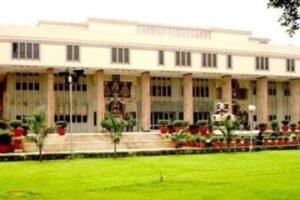‘Decision of Majority Decision Of House’: Kerala HC Rules That Minority Dissenter Of Municipal Council’s Resolution Cannot Invoke Article 226 To Challenge Same
Case: Janees P.S. v. Thrissur Municipal Corporation & Ors. and connected matters
Coram: Justice Bech Kurian Thomas
Case No.: WP(C) NO. 3668 OF 2023
Court Observation: “…if those persons who dissent against a decision taken by the Municipal Council are permitted to challenge the decisions of the Municipality, it will put spokes in the wheels of governance and administration. Every decision taken by the Municipal Council or local authority will be challenged by the minority, and the entire functioning of the local authority can come to a standstill. Such a procedure cannot be permitted under law. The principle that a decision taken by the majority becomes the decision of the house, including that of the minority, cannot be diluted, lest it lead to chaos and confusion,”.
“The decision of the majority of the Municipal Council is, irrespective of the dissent, the decision of the dissenting minority, too. If the Councillors disrupt the proceedings and refuse to participate in the discussions, they do so at their peril. They cannot thereafter turn around and object to the decisions taken therein as the governance of the Corporation has to be carried on, and they had opted out of the discussions and the consequent decision. If time-bound decisions are not taken, it would cause prejudice to the public at large. The interest of the public cannot be ignored by the elected representatives of the people by disrupting the proceedings. The Councillors are elected to voice the views of the people. The elected Councillors have no authority to disrupt the proceedings of the Council. The Councillors must be reminded that the decisions taken by the Municipal Council will be binding. Since those disrupting the proceedings of the Municipal Council cannot be regarded as having participated in the discussion, the allegation that 30 out of 54 Councillors dissented from the decision cannot be accepted,”.
“The exigency of the situation warranted immediate action to be taken to identify a prospective licensee. There are no proven malafides in selecting the licensee. The said licensee has been permitted to carry out renovation works at his own cost without claiming any amount from the Corporation. The cost of renovation works is stated to be more than Rs.3 Crores. Since the Corporation fund will not be utilised for such renovation works and the works done on the building will ultimately enure to the benefit of the Corporation itself, this Court finds no reason to interfere with any of the proceedings initiated by the Corporation in awarding the license to Sri. Janeesh to run the Bini Tourist Home, as well as the permission granted for carrying out the repair and renovation works,”
Previous Posts
DISCOMS As State Bodies Duty Bound To Protect Consumers’ Interests: Rajasthan High Court
Bombay High Court Quashes Reassessment Proceedings Against Non-Existent Entity Despite Active PAN




